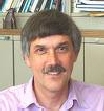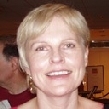 |
 |
An Interview With David Radavich
Daiva Markelis
| Y |
ou've been at Eastern for (is it twenty?) years. How have the university and the community changed since you first started teaching here? What's better? Worse?
I
have spent over 25 years at Eastern, and I am happy to report that
our university is better than ever in almost every respect. When
I came, faculty salaries were unconscionably low, and many of us felt
dispirited. Students didn’t seem nearly as comfortable being here
as they do now. The architecture has improved markedly through such
aesthetically pleasing additions and renovations as the
Academic
programs at Eastern have continued to improve, and we are closer to
achieving a prestigious Phi Beta Kappa chapter than we have ever been.
In many categories, EIU ranks second only to the U of I in excellence
among
The ongoing problems we face — illiteracy and innumeracy among students ill-prepared for college work, woefully inadequate state funding of higher education — remain vexing and disheartening. But these problems are caused by forces widespread in our commercialist culture and are not unique to Eastern. We must combat them as best we can. But for me, EIU remains a special place — even a sacred place — where faculty, staff, and administration endeavor to prepare and transform the lives of our students for the decades ahead.
| A |
re
there particular memories that stand out for you concerning life in
the English Department?
In terms of numbers, Eastern’s Department of English has remained remarkably stable over the quarter century I have taught here. Of course there have been waves of retirements and arrivals, a shifting of generations. In the late ‘80s and early ‘90s, the department weathered its subdued version of the “canon wars” going on more vociferously elsewhere. Some department meetings became heated over shifts away from the traditional canon to include more diversity, post-colonial studies, etc. I felt sympathy with both sides of that debate. Over time we achieved a fairly healthy balance between cultural studies and traditional authors and periods. We’ve also expanded in such areas as creative and professional writing and film studies. Our relatively new two-year M.A. program is much stronger than the old one-year curriculum. So the department is in better shape overall, in my view.
I have always loved the fact that we all teach composition; that links annually contracted and tenure-line faculty in a vital shared endeavor. We have been fortunate not to have had many divisive fights and to have enjoyed the leadership of chairs and deans who respected what we do and did not impede our teaching or creativity. That has not been true, unfortunately, of other departments on campus. I hope the new Dean of Arts and Humanities will continue that tradition.
| Y |
ou're a noted and accomplished poet and playwright. Has
I’m
not from the Midwest originally — born in
My
plays are set in a variety of locations in this country and abroad,
not many of them in the
In
the past decade, I have written a wide range of scholarly essays on
Midwestern drama. These examine early pioneers like Mark Twain and
William Dean Howells as well as twentieth-century authors like Susan
Glaspell, Thornton Wilder, Tennessee Williams, William Inge, David
Mamet, Sam Shepard, and others up to August Wilson and beyond. One
of my essays focuses on the plays Arthur Miller wrote after studying
in the
Of
my creative work, my poetry has been especially touched by living
in the
I
have drawn much inspiration from
| W |
hat are your plans for retirement? Will you continue to write and
publish? Any travel plans?
I
certainly plan to continue writing poetry and drama. I’m hoping to
become involved with a few theatres in
I
have been a member of the North Carolina Writers’ Network for five
or six years now, and I have recently joined the Charlotte Writers’
Club. I look forward to meeting fellow writers and making connections
in my new region. For the past two years, I have served as vice president
of the Thomas Wolfe Society, responsible for organizing conferences
in
I’m
sure I will do some gardening and take care of much-needed house repairs.
But I’m not someone who would enjoy lounging around or playing golf. I
am committed to peace and social justice issues and hope to pursue
service in that arena. I sense a particular need in
Travel is a given! Despite increasing hassles in airline and other transport, Anne and I love to visit friends and relatives and see various corners of the world.
| W |
hat do you feel have been your greatest accomplishments here at Eastern?
On
the personal level, my greatest accomplishments at Eastern have probably
been the poetry and plays I have written while living here. I’ve
never felt the need to go to a writers’ colony because
Of course, I would like to think I’ve made a lasting, positive difference in the lives of my students — I tried to be a nurturing presence yet strict upholder of standards — but ultimately, my students will have to render that judgment for themselves. I certainly hope I made a difference.
I
do not consider myself an academic scholar in the conventional sense,
yet I was able virtually single-handedly to establish and expand the
scholarly study of drama from or about the
In terms of impact on other people at Eastern, I would have to say my service in the leadership of UPI, our faculty and staff union, has been my greatest accomplishment — in concert with many others. When I came to Eastern, faculty salaries ranked over 30% below national norms for universities like ours, and annually contracted faculty received neither pensions nor health insurance. Through decades of committed effort by many colleagues — I served as Chapter Vice President from 1998-2000 and President from 2000-2003 — we were able to provide far better benefits for our faculty and staff.
A personal climax in my role as Chapter President occurred early in 2003, when negotiations had stalled miserably and I had the responsibility for calling for a strike authorization vote — a huge gamble! But the faculty backed me up with an 89% vote in favor, the administration settled the next day, and we achieved a good contract that we have since built on.
I take vicarious pride in the accomplishments of my wife, Anne, particularly her leadership as Graduate Director and her many years on Faculty Senate, culminating in her service as Faculty Senate Chair. I have been fortunate to have very talented colleagues to work with over the years, which contributed to a larger sense of communal accomplishment.
I take pleasure in all these outcomes that intersect with each other and may only have been possible at Eastern, with our particular history, setting, and constellation of people.
| W |
hat will you miss the most about Eastern?
I
will certainly miss the beauty of the campus, where I walk nearly
every day. I love Booth Library, the
I will certainly miss particular colleagues and students, but perhaps even more, I will miss the diverse tapestry of people who make Eastern possible. This includes not just faculty but staff all over campus — I’m thinking of building service workers, painters, secretaries, librarians in Booth, workers in Benefits or Records or Admissions, administrators, and of course, Larry Shobe, the tireless landscape gardener who creates with his colleagues such wonderful floral displays. All these people are engaged in a common mission to educate the next generations of students and to keep this venerable institution going and growing. I’ve not seen that kind of community anywhere else.
![]()
top | home | this issue